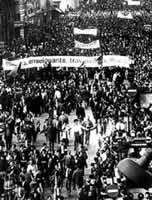

So the king says he is going to hold municipality elections within a year of 2/1 and parli
 amentary elections withi
amentary elections withi n three years of the same date, when he will handover power.
n three years of the same date, when he will handover power.This regime is illegitimate. And so there is no question of the political parties participating in anything organized by this government.
But there also are technical questions.
Will the Maoists allow the elections? Isn't there a military stalemate in the country?
And if the elections are a way to forego talks with the Maoists, does that not merely prolong the civil war? The common wisdom is that talks are the best way out, the only way out.
The election talk is like another of the king's illegitimate moves, this whole idea of snatching away some members of the various political parties to induct into his cabinet. If that is his way of saying even people from various parties are with him, he is sorely mistaken. Individuals who are no longer members of parties are not democrats supporting 2/1.
And the move actually is a big reason why the king should not be paid as much by the Nepali people. You take money from the Nepali people, and you organize a coup to take
 pow
pow er away from them. Neither the money nor the power is yours. So when you buy away politicians with that money and power, what message are you sending?
er away from them. Neither the money nor the power is yours. So when you buy away politicians with that money and power, what message are you sending?Of course I don't know the king, never met him, and all that good stuff. But going by his public actions, the only thing he will respond to will be a major people's movement. Statements by individuals, domestic or foreign, is not going to budge this guy. The movement is also important to polish up the democracy itself, to offer a better, more transparent, more vibrant, more responsive democracy than what we had in the 1990s. The movement is for democracy in the country, and for democracy inside the political parties.
I almost feel like Tulsi Giri saying it is either monarchy or democracy is Giri speaking on behalf of the king. Either he is going to be an active monarch or he will be a private citizen, a businessman. He does not wish to be a constitutional monarch. To each his or her own.
There are no short cuts to a movement. I think the talk should be on the logistics of the movement.
Monarchism is an ideology, just like Maoism. There are Maoists, there are Monarchists.
It is a group driven by a certain ideology. Before you can deal with them, you have to see them for who they are. To a
 ppeal to their good side is naive. What is the good side to Tulsi Giri!
ppeal to their good side is naive. What is the good side to Tulsi Giri!Narahari Acharya For Nepali Congress President
Acharya is in news today saying he might contest for the party presidency. (Narahari Acharya Deserves A Platform August 17)
- Acharya to contest NC presidency Kantipur
The party is not any person or family's private property. It is a public institution. It belongs to all its members.
Email From Bimalendra Nidhi
I received an email from Bimalji yesterday. I was delighted.
Nidhi was born in 1955. He was president of Nepal Student Union from 1980 to 1983. He has a Masters degree from Tribhuvan University. He is an Executive Member of the Central Working Committee and Chief of the Policy and Program Development of the Nepali Democratic Congress.
Date: Thu, 18 Aug 2005 22:43:49 -0700 (PDT)
From: "Paramendra Kumar Bhagat"
Subject: Re: Hello from Nidhi.
To: "Bimalendra Nidhi"
CC: "_______"
Nidhiji. There are many people you should meet. And we will help arrange.
But these four names stand out.
_______, ______, and _______ are with the Alliance For Demoracy And Human Rights In Nepal, the number one organization working for democracy in Nepal.
And ______ runs _____.
We will look forward to seeing you.
Hello ___, ___, ____, _____. Nidhiji is a man who needs no introduction. He was the first person Deuba inducted into his cabinet after he became Prime Minister.
His family is like Koirala or Singh. It has made major sacrifices for democracy.
For me what is really big is that Nidhiji is a fellow Janakpuriya.
From: "Bimalendra Nidhi"
To: paramendra@yahoo.com
Subject: Hello from Nidhi.
Date: Thu, 18 Aug 2005 22:06:35 +0545
Dear Parmendra Bhagatji.
Thank you very much for regular mail.Specialy dedicated on Democracy.
We might come to the US.May be in the last week of September 2005.Hope we will meet there. If it is possible please send me email addresses of some friends whom I should meet over there.
With good wishes.
Bimalendra Nidhi.
Kathmandu, Nepal.

